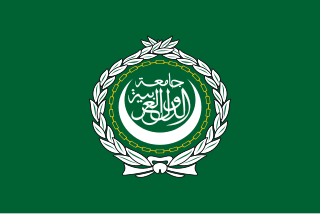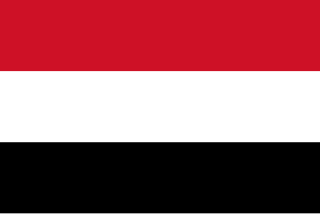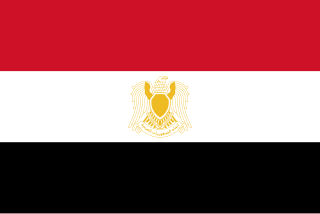
Ensuring national security, increasing influence among its Arab neighbours and securing the return of the Golan Heights, have been the primary goals of the Syrian Arab Republic's foreign policy. At many points in its history, Syria has seen tension with its neighbours, such as Turkey, Israel, Jordan, Iraq, and Lebanon. Syria enjoyed an improvement in relations with several of the states in its region in the 21st century, prior to the Arab Spring and the Syrian Civil War.

The Arab League, formally the League of Arab States, is a regional organization in the Arab world. The Arab League was formed in Cairo on 22 March 1945, initially with six members: Egypt, Iraq, Transjordan, Lebanon, Saudi Arabia, and Syria. Yemen joined as a member on 5 May 1945. Currently, the League has 22 members.

The Arab world, formally the Arab homeland, also known as the Arab nation, the Arabsphere, or the Arab states, comprises a large group of countries, mainly located in Western Asia and Northern Africa. While the majority of people in the Arab world are ethnically Arab, there are also significant populations of other ethnic groups such as Berbers, Kurds, Somalis and Nubians, among other groups. Arabic is used as the lingua franca throughout the Arab world.

The State flag of Yemen was adopted on May 22, 1990, the day that North Yemen and South Yemen were unified. The flag of Yemen is the Arab Liberation Flag of 1952, introduced after the Egyptian Revolution of 1952 in which Arab nationalism was a dominant theme. The Arab Liberation Flag of 1952 served as the inspiration for the flags of both North and South Yemen prior to unification, as well as for the current flags of Egypt, Iraq, Sudan, Palestine and Syria.

The current flag of Sudan was adopted on 20 May 1970 and consists of a horizontal red-white-black tricolour with a green triangle at the hoist. The flag is based on the Arab Liberation Flag of the Egyptian Revolution of 1952, as are the flags of Egypt, Iraq, Syria, Yemen, and Palestine and formerly of the United Arab Republic, North Yemen, South Yemen, and the Libyan Arab Republic.
The Janjaweed are an Arab nomad militia group from the Sahel region that operates in Sudan, particularly in Darfur, and eastern Chad. They have also been speculated to be active in Yemen. According to the United Nations definition, Janjaweed membership consists of Arab nomad tribes from the Sahel, the core of whom are from the Abbala Arabs, traditionally employed in camel herding, with significant recruitment from the Baggara.

The Federation of Arab Republics was an unsuccessful attempt by Muammar Gaddafi to merge Libya, Egypt and Syria in order to create a unified Arab state. Although approved by a referendum in each country on 1 September 1971, the three countries disagreed on the specific terms of the merger. The federation lasted from 1 January 1972 to 19 November 1977.

The Arab Parliament is the legislative body of the Arab League. At the 19th Arab League Summit in Amman, the Arab states agreed to create an Arab Parliament, and came up with a resolution to give Amr Moussa the Secretary General of the Arab League the power to start and create the Parliament. In 2004, in the ordinary Arab League Summit in Algiers was the official date where all Arab League Members agreed to send their representative to the temporary Parliament sessions that took place in the headquarters of the Arab League in Cairo, Egypt, with each member state sending four members, until the Parliament is reassigned permanently to its under-construction office in Damascus.

The Arab League or League of Arab States was founded by Egypt in 1945, has 22 members and seven observer members so far: Armenia, Brazil, Chad, Eritrea, Greece, Republic of India, Venezuela.

Model Arab League is an educational simulation in which students learn about diplomacy and international relations through debates in multi-regional model competitions, competing as representatives from the Member States of the Arab League. MAL was established in 1983 by The National Council on US - Arab Relations as a Youth Leadership Development Program.
The Arab Cold War was a political rivalry in the Arab world from the early 1950s to the late 1970s, as part of the wider Cold War. It is generally accepted that the beginning of the Arab Cold War is marked by the Egyptian revolution of 1952, which eventually led to Gamal Abdel Nasser becoming president of Egypt in 1956. Thereafter, newly formed Arab republics, defined by revolutionary secular nationalism and inspired by Nasser's Egypt, engaged in political rivalries with conservative traditionalist Arab monarchies, led by Saudi Arabia. The Iranian Revolution of 1979 is widely seen as the end of this period of internal conflict and rivalry. Ayatollah Ruhollah Khomeini was installed as the leader of Iran's theocratic government. A new era of Arab-Iranian tensions followed, overshadowing the bitterness of intra-Arab strife.

The Economic and Social Council of the Arab League is an institution of the Arab League that co-ordinates its economic integration. The ESC was established as the Economic Council under the terms of the Joint Defence and Economic Co-operation Treaty (1950). and held its first meeting in 1953. In 1957, the ESC established the Council of Arab Economic Unity (CAEU) and, in February 1997, the ESC adopted the Agreement to Facilitate and Develop Trade Among Arab Countries (1981) in pursuit of the Greater Arab Free Trade Area (GAFTA).

The member states of the African Union are the 55 sovereign states that have ratified or acceded to the Constitutive Act of the African Union to become member states to the African Union (AU). The AU was the successor to the Organisation of African Unity (OAU), and AU membership was open to all OAU member states.

The Organisation of Islamic Cooperation founded in 1969 has 57 members, 56 of which are also member states of the United Nations, with 48 countries being Muslim majority countries. Some member countries, especially in West Africa and South America, are – though with large Muslim populations – not necessarily Muslim majority countries. A few countries with significant Muslim populations, such as Russia and Thailand, sit as Observer States.

The Arab Spring or the First Arab Spring was a series of anti-government protests, uprisings and armed rebellions that spread across much of the Arab world in the early 2010s. It began in Tunisia in response to corruption and economic stagnation. From Tunisia, the protests then spread to five other countries: Libya, Egypt, Yemen, Syria and Bahrain. Rulers were deposed or major uprisings and social violence occurred including riots, civil wars, or insurgencies. Sustained street demonstrations took place in Morocco, Iraq, Algeria, Lebanon, Jordan, Kuwait, Oman and Sudan. Minor protests took place in Djibouti, Mauritania, Palestine, Saudi Arabia and the Moroccan-occupied Western Sahara. A major slogan of the demonstrators in the Arab world is ash-shaʻb yurīd isqāṭ an-niẓām!.

The Mashriq, also known as the Arab Mashriq, sometimes spelled Mashreq or Mashrek, is a term used by Arabs to refer to the eastern part of the Arab world, located in Western Asia and eastern North Africa. Poetically the "Place of Sunrise", the name is derived from the verb sharaqa, from the sh-r-q root (ش-ر-ق), referring to the east, where the sun rises.

The Arab Socialist Ba'ath Party, also referred to as the pro-Iraqi Ba'ath movement, is a neo-Ba'athist political party which was headquartered in Baghdad, Iraq, until 2003. It is one of two parties which emerged from the 1966 split of the original Ba'ath Party.

A Unified Political Command, also translated as Joint Political Command or Unified Political Leadership, was agreed in 1964 between the presidents of Egypt and Iraq as well as between the presidents of Egypt and North Yemen. Both projects were parallel but not linked with each other. The Unified Political Command was meant as a kind of transitional government which should prepare the gradual merger of Iraq with Egypt and North Yemen with Egypt in a new United Arab Republic.
The Federation of Arab News Agencies (FANA), a branch of the Arab League, is a membership organization for Arabic-language, national news agencies, currently of 18 or 19 members and established in 1975 in Beirut, Lebanon.




















